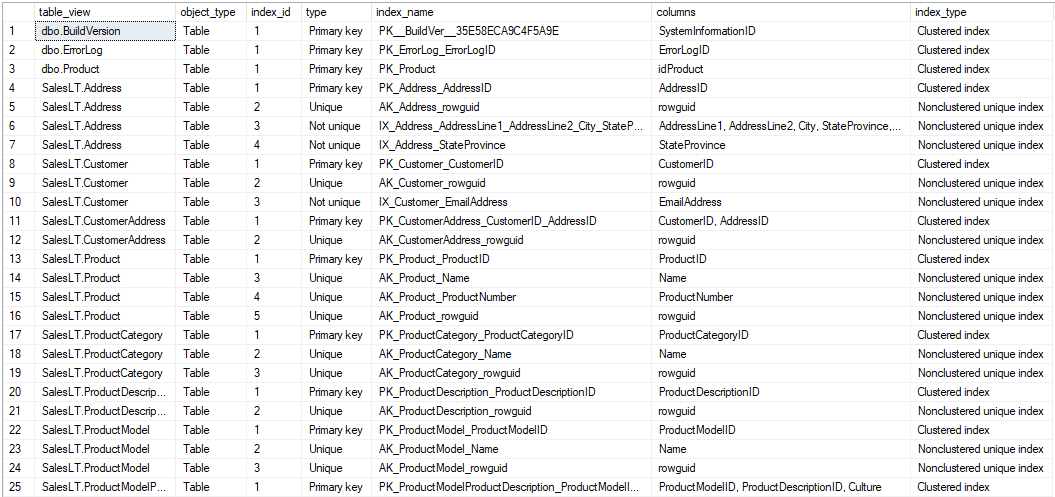The query below lists table (and view) indexes.
Query
select schema_name(t.schema_id) + '.' + t.[name] as table_view,
case when t.[type] = 'U' then 'Table'
when t.[type] = 'V' then 'View'
end as [object_type],
i.index_id,
case when i.is_primary_key = 1 then 'Primary key'
when i.is_unique = 1 then 'Unique'
else 'Not unique' end as [type],
i.[name] as index_name,
substring(column_names, 1, len(column_names)-1) as [columns],
case when i.[type] = 1 then 'Clustered index'
when i.[type] = 2 then 'Nonclustered unique index'
when i.[type] = 3 then 'XML index'
when i.[type] = 4 then 'Spatial index'
when i.[type] = 5 then 'Clustered columnstore index'
when i.[type] = 6 then 'Nonclustered columnstore index'
when i.[type] = 7 then 'Nonclustered hash index'
end as index_type
from sys.objects as t
inner join sys.indexes as i
on t.object_id = i.object_id
cross apply (select col.[name] + ', '
from sys.index_columns as ic
inner join sys.columns as col
on ic.object_id = col.object_id
and ic.column_id = col.column_id
where ic.object_id = t.object_id
and ic.index_id = i.index_id
order by col.column_id
for xml path ('') ) as D (column_names)
where t.is_ms_shipped <> 1
and index_id > 0
order by schema_name(t.schema_id) + '.' + t.[name], i.index_id
Columns
- table_view - name of table or view index is defined for
- object_type - type of object that index is defined for:
- Table
- View
- index_id - id of index (unique in table)
- type
- Primary key
- Unique
- Not unique
- index_name - index name
- columns - list of index columns separated with ","
- index_type - index type:
- Clustered index
- Nonclustered unique index
- XML index
- Spatial index
- Clustered columnstore index
- Nonclustered columnstore index
- Nonclustered hash index
Rows
- One row: represents an index
- Scope of rows: all indexes (unique and non-unique) in databases
- Ordered by: schema, table name, index id
Sample results












 Rene Castro
Rene Castro